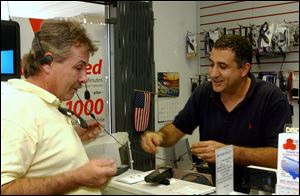
Pending legislation likely to boost sales of hands-free cell phones
7/6/2004
Steve Mourad, right, assists Rick Dusseau with a headset at Page Plus Communication.
Any driver who's been stuck behind a wayward driver distracted by a hand-held cell phone can take heart.
In the not-too-distant future, those who like to yak on their phones while driving could pay $10 to $350 to continue to do so.
And if a bill stalled in the Ohio Legislature gets passed, talking while driving could mean a fine of at least $100 for anyone involved in a crash while holding a cell phone.
As of last weekend, drivers in New Jersey and the District of Columbia are subject to new "hands-free" cell phone laws that carry $100 fines. In Washington, 1 point is added to a violator's driving record.
The two jurisdictions join New York and a handful of mostly small cities across the nation, including the Cleveland suburb of Brooklyn, and 25 countries that have passed "hands-free" or driving-while-distracted laws.
Ohio is in its third try of considering such legislation, the main sponsor of which is Rep. Catherine Barrett, a Cincinnati Democrat.
The legislation has been bottled up in the House Transportation Committee.
But Ms. Barrett is hopeful of getting a new hearing on the bill in September, driven by the growing movement by other states to study information on cell phones and highway crashes.
Local cellular phone dealers say that, if Ohio were to pass Ms. Barrett's bill, their sales of accessories would increase. Cell phone owners who don't have "hands-free" devices would have to buy them and, depending on their choices, spend $10 to $350.
Terry Ramer, owner of Choice Communications in Sylvania, a Nextel dealer, said simple hands-free options include a small ear piece that costs $10 and plugs into a phone. A wireless version costs $125 to $150.
Also available are car kits that contain a power converter, a dashboard mount for the phone, a roof-mount antenna, a microphone attached to the sun visor, and an external speaker.
Some even play through the radio speakers. Cost: $200 for the kit and $100 to $150 for installation, Mr. Ramer said.
A small do-it-yourself kit, with a portable speaker, antenna, and clip-on microphone, sells for $70 to $100.
Other cell-phone makers are adding speakers to their phones, enabling a user to attach it to the dashboard, turn on the phone's speaker, and communicate. The phones, depending on calling plans, retail for $20 to $75, Mr. Ramer said.
As for the law itself, Mr. Ramer said, there are many distractions in cars, such as eating, putting on makeup, or watching TV.
Ms. Barrett, whose bill provides a $100 fine for a first offense, said she could add other distractions to the legislation.
"I've tried to say I'm not against the industry, because cell phones are a necessity," she said, adding that her car has twice been rear-ended as a result of a driver's being distracted by using a cell phone.
Surprisingly, one of Ms. Barrett's supporters - the only major supporter thus far - is Verizon Wireless, the largest supplier of cellular service nationwide. Verizon also backed the New York and New Jersey laws. All other cell phone carriers and manufacturers either are against such legislation or are neutral.
Laura Merritt, a Verizon spokesman in Columbus, said the company, which prohibits its employees from using a hand-held cell phone while driving, supports measures that reduce driver distractions except for emergency calls.
Contact Jon Chavez at:
jchavez@theblade.com
or 419-724-6128